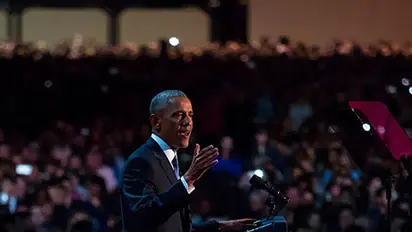‘Yes, we did’: But how much did you really do, President Obama?

Synopsis
Obama delivered a rousing farewell speech, calling for unity. Despite his popularity, Obama leaves behind a divided nation and weak economy. His foreign policy has primarily focused on ‘disengagement,’ increasing instability.
Symbolism becomes poignant when an exercise in greatness winds down in the place where it first began. This was the case on January 10 as U.S. President Barak Obama delivered his farewell address in front of a packed audience at the McCormick Place convention center in Chicago, the city where he started his career in public life as a community organiser.
As has been his habit, Obama gave a rousing speech, wooing the American and world press by modifying his slogan of “yes, we can” by adding “yes, we did” to highlight his administration’s success. In terms of personal popularity and ability as a communicator, among recent American presidents, Obama only has Ronald Reagan as a rival. Obama’s oratory will certainly be missed as his successor is considered to be the most acerbic person who will enter the Oval Office.
Even as Obama eloquently defended his legacy in his speech and appealed for unity, cutting across differences, what is the state of the United States now? The U.K.’s Daily Telegraph recently referred to a survey conducted after the 2016 election: While 27% of Americans said they felt more united under Obama’s presidency, 44% felt that the country had become more divided. This statistic highlights the paradox of Obama in that while he retained personal popularity, his policies have not been well received across the country.
Asianet Newsable examines some issues that are a blot on Obama’s legacy:
Partisan rancour in politics: Obama first made headlines with a speech during his Senate bid in 2004, calling for bipartisan unity. It is ironic that his two terms saw a worsening of relations between Republicans and Democrats, particularly as more right-wing elements such as the Tea Party movement came to prominence.
Support to politics as usual over idealism: If Obama was considered the dream candidate who rose above politics in 2008, his support to a career politician in Hillary Clinton offended even hardcore Democrats. Obama did nothing as groups favouring Hillary manipulated Democrat primaries to defeat the “outside” candidate, Bernie Sanders. Many Sanders’ supporters reportedly stayed home during the presidential elections.
Race relations are worse off: The first “black” president was expected to work wonders in race relations. Obama never got around to addressing the root causes of racial disenchantment, with some policies, such as closure of hundreds of public schools, adversely affecting the black population. Further, his decision to raise the number of refugees and enthusiasm for legalisation of aliens alienated large sections of middle-class white Americans.
Obamacare — a dream turned nightmare: Obama’s plank of an affordable health system for all Americans, which materialised in the Affordable Care Act in 2010 (popularly called Obamacare), was well received by all except the most strident right wingers. However, Obamacare’s shoddy implementation and skyrocketing premiums have affected insurers, healthcare professionals and payers. Bloomberg reported in August that insurance companies had lost nearly $2 billion in Obamacare in 2016.
Missed opportunities galore in foreign relations: Despite getting the Nobel Peace Prize a year after he became president, Obama leaves behind a world in turmoil. The hasty pullout of U.S. troops from Iraq that Obama had made a campaign plank has helped in the rise of ISIS. Obama’s selective support for “democracy” saw brief instability in Egypt even as traditional American allies such as Saudi Arabia thrived in their autocratic, authoritarian ways. The “disengagement” in Europe and Asia has paved the way for the near-imperial rise of Russia and China, respectively.
Jobless economic recovery: Obama can proudly claim that one of his biggest achievements was dealing with the economic recession of 2008. But more state intervention in a market economy is never aimed at creating jobs. Millions remain unemployed and the U.S. manufacturing sector is a shadow of itself in the face of overregulation, environmental restrictions and growing foreign competition.
Obama has often claimed to look up to Reagan as a role model. He has tried to portray himself as the Reagan of liberalism. The worst indictment of the Obama years is that while Reagan was succeeded by a person who continued the Republican’s policies, Obama will be followed by someone hell-bent on undoing his policies.
Check the Breaking News Today and Latest News from across India and around the world. Stay updated with the latest World News and global developments from politics to economy and current affairs. Get in-depth coverage of China News, Europe News, Pakistan News, and South Asia News, along with top headlines from the UK and US. Follow expert analysis, international trends, and breaking updates from around the globe. Download the Asianet News Official App from the Android Play Store and iPhone App Store for accurate and timely news updates anytime, anywhere.